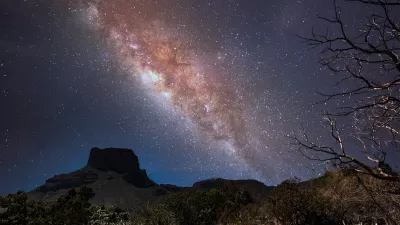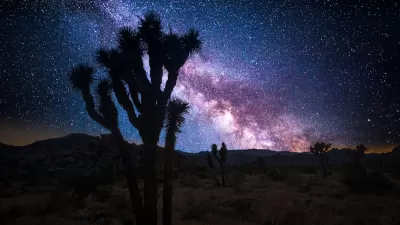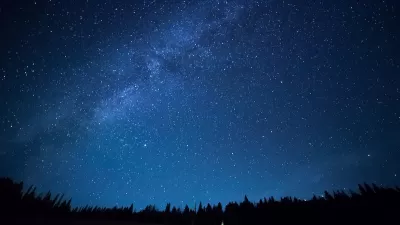A movement to shed light on the worldwide loss of dark skies aims to minimize light pollution in order to increase public opportunities for stargazing, while also serving as a money-saving measure for cities, reports Kate Galbraith.
"Everywhere, light pollution is an increasing problem," said Andrej Mohar, an amateur astronomer in Slovenia who has lobbied for light regulations there. Around the world, children and adults have become less aware of the cosmos above, since "it has become harder than ever to see the stars, as cities with their 24-hour lights continue to sprawl." So, in recent years, educators and organizers have called for the curbing of excessive lighting and the preservation of dark skies.
"An Arizona-based group called the International Dark-Sky Association," states Galbraith, "has led advocacy efforts worldwide for preserving the night skies. The designation of dark-sky parks and reserves is based on the idea "to single out areas that offer excellent stargazing and also work to keep night lighting minimal." For example, the NamibRand Nature Reserve in Namibia was chosen as the first reserve in Africa because "the dry air and remote location make for clear skies and good nighttime viewing."
"The biggest battle of all, of course," writes Galbraith, "involves getting enough people to care." Three areas in Britain have received "massive media coverage," but she notes that the "dark-sky cause has been aided by fiscal problems." In Britain, cities regard minimizing light pollution as a money-saving measure.
Technology is also aiding efforts to reduce light pollution. Better fixtures and so-called smart grid systems, which use sensors to operate lights based on movement, can save energy as well as light.
FULL STORY: Progress in Fight to Keep Night Skies Dark

Planetizen Federal Action Tracker
A weekly monitor of how Trump’s orders and actions are impacting planners and planning in America.

Map: Where Senate Republicans Want to Sell Your Public Lands
For public land advocates, the Senate Republicans’ proposal to sell millions of acres of public land in the West is “the biggest fight of their careers.”

Restaurant Patios Were a Pandemic Win — Why Were They so Hard to Keep?
Social distancing requirements and changes in travel patterns prompted cities to pilot new uses for street and sidewalk space. Then it got complicated.

Maui's Vacation Rental Debate Turns Ugly
Verbal attacks, misinformation campaigns and fistfights plague a high-stakes debate to convert thousands of vacation rentals into long-term housing.

San Francisco Suspends Traffic Calming Amidst Record Deaths
Citing “a challenging fiscal landscape,” the city will cease the program on the heels of 42 traffic deaths, including 24 pedestrians.

California Homeless Arrests, Citations Spike After Ruling
An investigation reveals that anti-homeless actions increased up to 500% after Grants Pass v. Johnson — even in cities claiming no policy change.
Urban Design for Planners 1: Software Tools
This six-course series explores essential urban design concepts using open source software and equips planners with the tools they need to participate fully in the urban design process.
Planning for Universal Design
Learn the tools for implementing Universal Design in planning regulations.
Heyer Gruel & Associates PA
JM Goldson LLC
Custer County Colorado
City of Camden Redevelopment Agency
City of Astoria
Transportation Research & Education Center (TREC) at Portland State University
Camden Redevelopment Agency
City of Claremont
Municipality of Princeton (NJ)





























